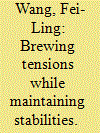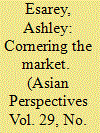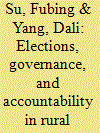| Srl | Item |
| 1 |
ID:
071708


|
|
|
|
|
| Publication |
2005.
|
| Summary/Abstract |
As a key institution in the PRC, the hukou (household registration) system defines and conditions Chinese politics, social life, and economic development. This article describes the current status of the hukou system and its significant changes, and outlines its complicated but crucial functions. The hukou system facilitates a rapid but uneven economic growth and creates significant social and regional disparities. It also helps greatly to stabilize the PRC sociopolitical order through an effective police control, while generating powerful tensions in the areas of human rights, equity of citizenship, and simple ethics. Further reform of the system is needed to continue its role in the Chinese political economy; yet a withering or abolition of the hukou may seriously challenge China's sociopolitical stability and economic growth.
|
|
|
|
|
|
|
|
|
|
|
|
|
|
|
|
| 2 |
ID:
071707


|
|
|
|
|
| Publication |
2005.
|
| Summary/Abstract |
Decentralization of state power over media ownership led to new challenges for state control of media content in the 1980s. Following the Chinese Communist Party's legitimacy crisis after Tiananmen, party leaders in charge of China's public media permitted greater freedom for news content deemed politically "safe," while maintaining tight control over politically sensitive news content. In order to supplement coercive strategies, the state developed market incentives to encourage media to produce news that was politically acceptable and popular with consumers. To test the extent to which commercial media have complied with the state's content priorities, this article considers evidence from a case study on news coverage of the Severe Acute Respiratory Syndrome (SARS), an epidemic seen by the party as threatening to regime legitimacy. The SARS case study reveals that in the presence of tremendous market demand for information, state control of the news media was considerable but not absolute.
|
|
|
|
|
|
|
|
|
|
|
|
|
|
|
|
| 3 |
ID:
071709


|
|
|
|
|
| Publication |
2005.
|
| Summary/Abstract |
While competitive elections are a crucial aspect of village democracy, they are only one means to achieving good governance. In this article, we consider village elections in the broader context of improving governance in China. We argue that the promotion of village democracy should be complemented by simultaneous improvements in a number of other non-electoral areas that enhance the accountability of public officials. The Chinese central government has paid greater attention to these institutional aspects in recent years. The leadership is willing to encourage local experiments and tolerate some unorthodox practices. This interaction between local initiatives and central interventions will shape the future of village democracy in rural China. We analyze several of them in particular: tax-for-fee reform, new accounting practices, village affairs disclosure, and institutionalized participation in democratic decision making. This article reveals great diversity and discusses the politics of these institutional changes.
|
|
|
|
|
|
|
|
|
|
|
|
|
|
|
|
| 4 |
ID:
071710


|
|
|
|
|
| Publication |
2005.
|
| Summary/Abstract |
The dimension of China's farm economy that has been least altered since the onset of the reforms in the early 1980s is the rural land system. However, in the face of mounting rural social tension and concerns over the impact of heightened trade liberalization on the domestic agricultural sector, Chinese authorities have recently undertaken a reform program to fundamentally alter the nature of agricultural land rights in the country. In the name of protecting farmers' rights and interests, new institutions are being established to certify rural land use rights and strengthen enforcement of these rights; facilitate the trade of these land use rights according to market principles; and settle disputes over tradable land use rights. These institutional reforms in the agricultural land management system are giving rise to a rural land market in China, based not on private land ownership but on a two-tiered rural land system that combines public ownership with the private leasing of user rights. These reform measures strengthen adherence to the rule of law in rural society and the market orientation of the rural economy, while at the same time reflect efforts to preserve China's state socialism.
|
|
|
|
|
|
|
|
|
|
|
|
|
|
|
|